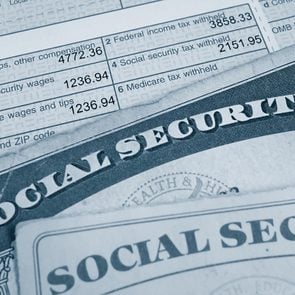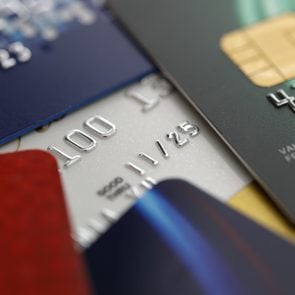After the most recent data breach, many people are wondering: Can you change your Social Security number? Here's what experts say.

5 Reasons You May Want to Change Your Social Security Number—and How to Do It

Thieves are constantly finding new ways to scam people, and technology is helping these bad actors execute cyberattacks at scale. Just this year, hackers stole customer records from several major companies—AT&T, Ticketmaster, Dell and Bank of America among them. But the data breach that has Americans anxiously asking, “Can you change your Social Security number?” happened this April. And it was a doozy.
A group of hackers claimed access to about 2.9 billion records stolen from background-check company National Public Data. The short story: The Social Security numbers of nearly every American (along with other personal data) may have been stolen. It’s unsettling, no doubt. After all, we’ve been trained to avoid disclosing our Social Security number for fear of identity theft. But the truth is, we have only so much control over our personal data.
At this point, you’re probably wondering, Can I change my Social Security number? We checked with cybersecurity and identity theft experts to get some answers and put your mind at ease. Ahead, they offer their top strategies and advice to consider before trying to change your Social Security number.
Get Reader’s Digest’s Read Up newsletter for more tech, travel, humor and fun facts all week long.
Can you change your Social Security number?
Yes, you can change your Social Security number (SSN)—in rare instances. While you might call your credit card company to put a hold on your account and get a new card when you think yours has been compromised, you can’t simply get a new Social Security number when you’re concerned about a data breach. In fact, despite the risk of a scammer getting ahold of this sensitive information, few people change their Social Security numbers.
“Accurate and up-to-date statistics on the number of Americans who apply for or successfully change their SSN each year are not readily available,” says Alan Saquella, a professor of global security and intelligence at Embry-Riddle Aeronautical University. He explains that requests for Social Security number changes are relatively uncommon, with the Social Security Administration (SSA) typically approving only a small percentage of applications due to the strict requirements. “The number of applications for SSN changes tends to fluctuate based on the prevalence of identity theft and other factors affecting personal safety,” he says.
5 reasons to change your Social Security number

You can’t change your Social Security number if you’ve lost your card and there’s no sign that someone else is using it. And you can’t change it to dodge the law or creditors or to escape the fallout from filing for bankruptcy. But can you change your Social Security number for other reasons?
Thankfully, you can. There are five main reasons you may want to (and be able to) change your Social Security number, according to Zulfikar Ramzan, PhD, chief of consumer digital safety and threat intelligence at Aura, a company focused on digital security and identity theft prevention.
Ongoing identity fraud
If you’re dealing with persistent identity theft that’s causing major financial headaches—like a family member continually opening new credit cards in your name—you might be able to get a new Social Security number. However, it’s not just about being a victim; you’ll need to show that you’ve tried everything else to fix the problem.
Threats to your safety
If someone is using your Social Security number to track you and threaten your safety, such as in cases of stalking or domestic violence, you might qualify for a new number. You’ll need to provide proof, such as police reports, to show that there’s a real danger.
Religious or cultural reasons
If the numbers in your Social Security number conflict with your personal beliefs or cultural practices, you might be able to request a change. But don’t think this is a quick path to a new number. As the Social Security Administration points out, you’ll need to provide “written documentation in support of the objection from a religious group with which the number holder has an established relationship.”
Duplicate numbers
In rare cases, the SSA might accidentally assign the same number to more than one person. If you find yourself in that situation, you can apply for a new number.
Family issues with sequential numbers
If you and a close family member have similar names and Social Security numbers, and if it’s causing problems with your legal or tax records, the SSA might consider giving you or your family member a new number.
How to change your Social Security number

Have you found yourself in one of the five situations that the SSA considers valid reasons for getting a new Social Security number? Below, Ramzan walks us through the steps and documents you’ll need.
Contact your local Social Security office
To start the process, reach out to your local Social Security office. You can find the location using the SSA office locator. Explain your situation. A representative of the SSA will likely ask you to fill out Form SS-5, the same form you used when you first applied for your Social Security number and Social Security card.
Collect proof of your identity
When applying for a new Social Security number, the SSA will require at least two original documents to prove you are who you say you are. Photocopies won’t do here. These need to be either original documents or copies certified by the issuing agency.
You’ll need documents that confirm both your citizenship (like a U.S. birth certificate or passport) and your identity (like a U.S. driver’s license or state ID card). The SSA will accept the following for U.S. citizens, though acceptable documentation varies based on whether you were born in the United States or abroad.
Documents for U.S. citizens
- U.S. birth certificate (required, if it exists)
- U.S. passport
- U.S. driver’s license
- State ID card
- U.S. hospital record of your birth
- Certificate of naturalization
- Certificate of citizenship
- Certificate of report of birth
- Consular report of birth abroad
- U.S. military identification card
- Health insurance card (not Medicare)
- School identification card
- Employee identification card
If your situation involves immigration status or a legal name change, be prepared to provide additional evidence.
Documents for non-U.S. citizens
- Foreign birth certificate (required, if it exists)
- Work permit (I-766)
- Permanent resident card (I-551)
- Arrival/departure record (I-94)
- Admission stamp in an unexpired foreign passport
Submit your application
Once you have all your documents together, contact your local SSA office again and let the Social Security representative know you’re ready to submit your application. They’ll guide you through the next steps and explain what you can expect from the process.
Update your bank and creditors
Once you’ve successfully changed your Social Security number, it’s important to notify your bank and any current creditors as soon as possible, says Michael Ashley, founder of Richiest.com and a veteran of the banking and financial services industries who did stints at Citibank and Wells Fargo.
“Start by contacting each institution directly, preferably in writing, and provide them with your new SSN, along with any required documentation to verify the change,” he advises. “This will help ensure that your credit history is updated correctly and that there are no interruptions in your accounts or services. It’s also a good idea to monitor your credit reports to make sure that the change has been properly reflected.”
What to consider before changing your Social Security number

It’s fine to ask yourself, “Can you change your Social Security number?” But don’t skip out on an equally important question: Should you change your Social Security number?
Ramzan suggests everyone consider these three factors before trying to change their Social Security number:
The impact on your financial records
Changing your Social Security number won’t wipe away your money woes. But it could make your financial situation a challenge and complicate your tax records.
“A new SSN won’t erase your issues, as the old number will still be linked to your records,” says Paige Hanson, a cybersafety and identity theft expert with nearly 20 years of experience at NortonLifeLock. “Additionally, starting with a new SSN essentially erases your credit history, making it challenging to secure loans, credit cards or even housing. Employment records, payroll and Social Security benefits are also tied to your SSN, further complicating matters.”
The necessary updates to your personal identification
You’ll need to apply for new identification documents, such as a driver’s license and passport, to reflect your new Social Security number. This involves filling out additional paperwork and waiting for processing, which can be time-consuming.
The potential administrative and legal challenges
The process of getting a new Social Security number requires significant documentation to prove eligibility and may involve lengthy administrative procedures. Additionally, there’s a risk of errors or confusion as your records are updated across various institutions.
“From my experience with identity theft victims, I don’t recommend changing your Social Security number,” says Hanson. “It should only be considered in extreme cases, like severe identity theft or domestic violence.”
In other words, she says, the perceived benefits rarely outweigh the drawbacks.
“It’s not the ‘silver bullet’ people might think it is,” Hanson explains. “Instead, I highly recommend considering a credit freeze, enrolling in identity theft protection and monitoring your credit report before making such a drastic change.”
About the experts
|
Why trust us
Reader’s Digest has published hundreds of articles on personal technology, arming readers with the knowledge to protect themselves against cybersecurity threats and internet scams as well as revealing the best tips, tricks and shortcuts for computers, cellphones, apps, texting, social media and more. For this piece on whether you can change your Social Security number, Jaime Stathis tapped her experience as a longtime journalist who covers technology, scams and cybercrime for Reader’s Digest to ensure that all information is accurate and offers the best possible advice to readers. We rely on credentialed experts with personal experience and know-how as well as primary sources including tech companies, professional organizations and academic institutions. We verify all facts and data and revisit them over time to ensure they remain accurate and up to date. Read more about our team, our contributors and our editorial policies.
Sources:
- New York Times: “What to Know About the Latest Social Security Number Breach”
- SSA: “Learn what documents you will need to get a Social Security Card”
- Zulfikar Ramzan, PhD, chief scientist at Aura
- Alan Saquella, assistant professor of global security and intelligence at Embry-Riddle Aeronautical University
- Paige Hanson, co-founder of SecureLabs
- Michael Ashley, founder of Richiest.com



